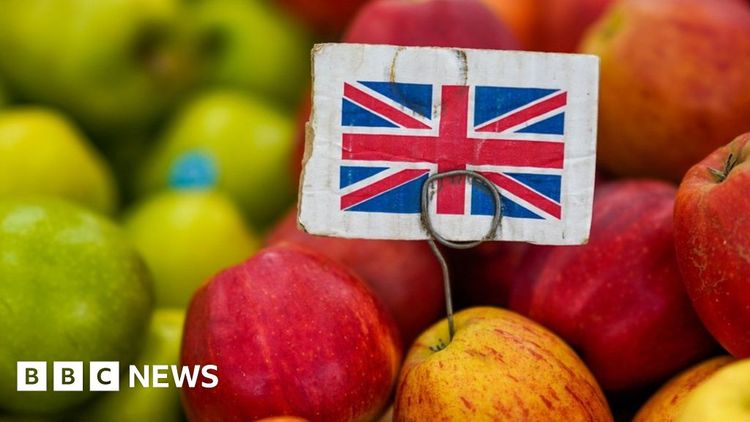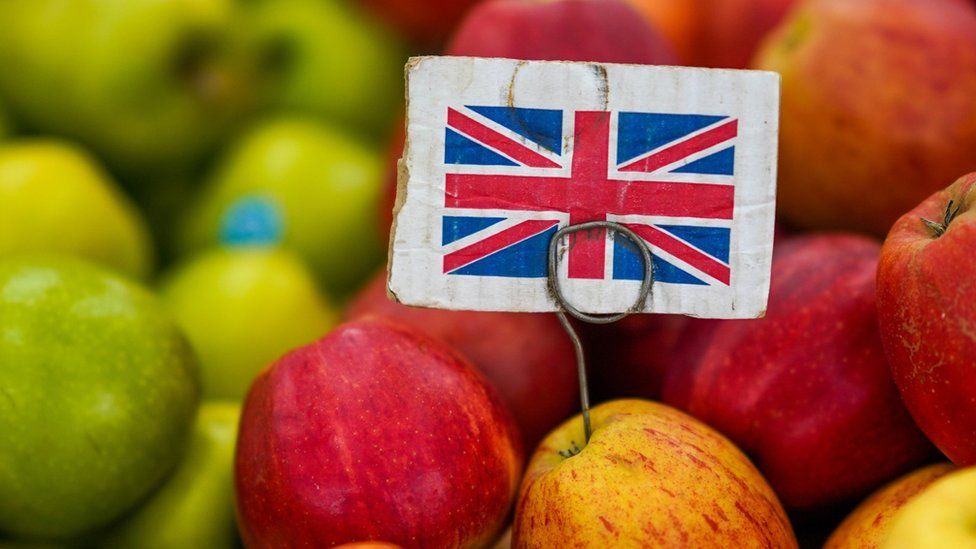Is Brexit behind the UK's inflation shock?

The featured picture can be credited to Getty Images.
The reporter who covers economics for the BBC's news division

The repercussions of Russia's invasion have caused significant disturbances in worldwide food and energy prices. Despite this, the increase of inflation in the UK has surpassed that of both the US and the EU, and has been much harder to manage.
There are individuals such as Mark Carney, who was once in charge of the Bank of England, that argue Brexit could be the reason for the current situation. However, it is not a simple matter and involves a number of factors.
It's difficult to pinpoint how much Brexit has affected us with everything else going on, like the pandemic and war. However, it seems like the extra paperwork and obstacles put in place to import goods into the country has contributed to increased food expenses.
Over 25% of the food we consume comes from the European Union.
A group of scientists from the London School of Economics (LSE) analyzed how the prices of certain goods increased compared to those of food from different places. However, it's important to note that these variations could be influenced by other factors, and not necessarily solely attributed to Brexit.
According to the experts, the implementation of these regulations could result in an additional cost of £250 to the average household for their grocery expenses from December 2019 to March 2023. This increase in cost would be most noticeable in the prices of meat and cheese.
They state that the majority of the increase, roughly £210, occurred prior to our present period of financial difficulty, from 2020 to 2021 when establishments were getting ready for and initially implementing the novel methods.
According to the LSE team, the modifications may have contributed to more than 25% of the increase in food expenses we have experienced since the conclusion of 2019. On the other hand, the gains achieved from the new trade deals settled after that time were insignificant.
Although Brexit may not have been the primary cause of the increasing food prices, it could have contributed significantly by raising the costs.
However, there is a tiny bit of solace in the situation. Despite the alterations, experts at Oxford Economics maintain that food prices in the UK are 7% lower compared to the EU average.
According to official figures, a comparative analysis of spending in the UK reveals a smaller proportion is invested in food as compared to France or Germany. In fact, it is recorded that less than £1 is spent on food for every £8 spent.
Nonetheless, going to the meat shop, delicatessen, or grabbing a pizza might end up costing even more money.
The part of import inspections and regulations that were delayed due to the pandemic will now be put into practice from October onwards to protect the UK against animal health threats and food fraud related issues. This step is being taken post-Brexit.
Over time, the administration has simplified various methods, leading to a significant decrease in the additional expenses for importers.
However, products such as meat, dairy, and fish will require a veterinarian's approval for safety, which may come with a substantial expense of several hundred euros prior to entering.
Any shipment of merchandise that falls into the medium- to high-risk categories that are imported to the United Kingdom will now have to pay an additional fee of as much as £43 when clearing customs.
The alterations will result in businesses spending hundreds of millions of pounds every year, which could ultimately be passed on to customers as an additional expense.
Photo credit, Getty Images
In the meantime, economists at the Centre for European Reform have projected that the termination of free movement will result in a decrease of 330,000 laborers in the UK.
Only 1% of employees are affected, but specific industries such as transportation, hospitality, and retail are experiencing severe staff shortages.
Employers who want to keep their staff may offer higher wages as an incentive. This may be good for employees who get a bigger salary increase than usual. However, this can also result in higher costs for customers.
Another potential consequence, which may not be as apparent, is that there has been a decrease in investments in areas such as machinery, training, and information technology since the referendum.
Experts in the field of economics, including those working for the government's independent forecasters, suggest that some of this difference between the UK and other countries could be attributed to the expenses or concerns caused by Brexit. This ultimately results in reduced efficiency within the country, driving up the overall costs of production.
After the Windsor Framework was put in place to establish the trade agreements between Northern Ireland and the Republic of Ireland with the EU, economists are optimistic that there will be less uncertainty which may result in an increase in investments. However, it is important to note that this may take some time to materialize.
The present surge in inflation is widespread all over the world. However, the increasing costs within the United Kingdom might involve an extra fee due to Brexit - and this couldn't come at a worse time, as families and enterprises are struggling to handle it all.









































